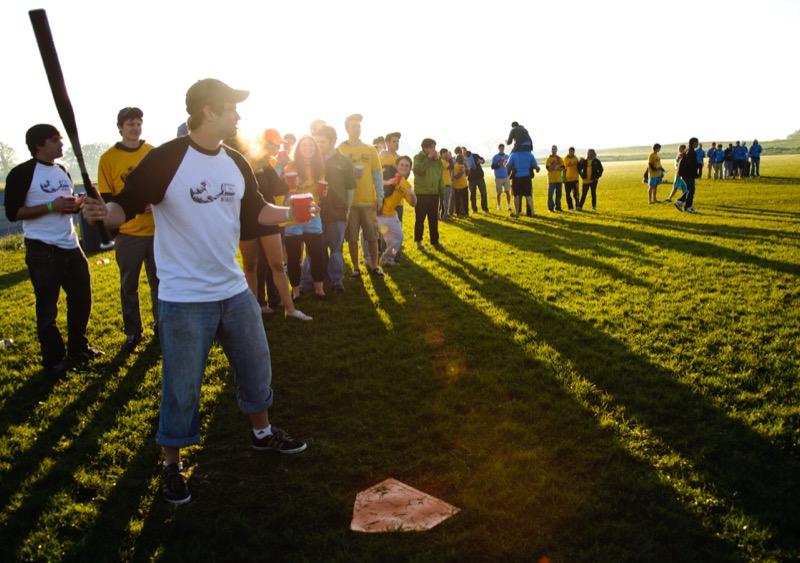Carleton’s annual Rotblatt tradition is set to take place for the first time since 2019 on 9th Weekend. The alcohol-filled softball game where participants must have a drink in hand to play is one of Carleton’s most famous traditions; but Rotblatt will look different this year than it did in previous years.
Carleton’s administration is enforcing two major changes for Rotblatt 156: limiting alcohol distribution to between 9 a.m. and 3 p.m. and prohibiting the Rotblatt committee from soliciting (but not from accepting) donations.
Dean of Students Carolyn Livingston explained that the overall goal of these changes is increased safety for participants, specifically reduced alcohol consumption.
“When Rotblatt originated, significantly fewer innings were played, so the game was shorter and less alcohol was consumed,” explained Livingston. “With 156 innings scheduled to be played this year, and given past experiences with early-morning and excessive drinking, we are concerned about students’ health and safety.”
Livingston noted that limiting alcohol distribution to before 9 a.m. is one strategy for limiting alcohol consumption, as is prohibiting the Rotblatt committee from soliciting donations.
“Historically, donations have been solicited specifically to purchase alcohol for the event,” said Livingston. “As we focus on reducing overall alcohol consumption during this all-day event, this is one additional strategy we can implement to increase student safety.”
Livingston emphasized that these two changes were both in the interest of students’ safety, and that no other changes are being made to the event.
“We know that Rotblatt is an important tradition for some members of our community, and we are focused on making it as safe as possible for the students who choose to participate.”
In a statement to the Carletonian, the Rotblatt Planning Committee expressed their excitement about having Rotblatt back after a two-year hiatus, as well as their compliance with new regulations.
“We’ve received support from alumni and students alike and we’re thankful and happy people are excited about Rotblatt making a comeback. We’re committed to making it a safe, fun time for everyone while still adhering to tradition as closely as we’re allowed to.”
While the committee presses on with Rotblatt preparation, some worry the changes enforced by administration will render the event fundamentally altered. Those worries were given voice in a recent anonymous Carletonian viewpoint article titled “Carleton Wants Rotblatt Dead.”
The article, which charged the administration with creating a “butchered version of Rotblatt,” prompted vigorous responses from students and alumni.
A commenter with the username “an extremely disappointed recent grad” wrote: “As someone who graduated last year, I can say definitively that the Carleton Administration has a goal of destroying Carleton’s unique culture. I know I speak for many of us when I say that I will never donate to Carleton unless they allow students to carry on these most beloved traditions. If these traditions disappear, then, frankly, Carleton is no longer my school.”
“Keep chipping away at the unique and long-standing traditions that Carls love, and you’re going to have fewer happy Carls,” wrote another commenter. “Carleton is not located as favorably as other ranking liberal arts colleges, and one of the reasons alums, like me (P ’19) send their kids back is BECAUSE of these unique traditions we cherished.”
Some alumni have voiced their displeasure with their checkbooks as well as their keyboards. According to a statement from the Rotblatt Planning Committee, the anonymous viewpoint article has ushered in more support for the event.
“We got a wave of alumni who saw or were referred to the article and asked us for ways to help. It’s awesome to belong to a community such as Carleton’s where tradition and culture is placed on such a pedestal. We really appreciate the economic, logistical, and just general support we’ve received in just a few days.”
Alumni are not the only people unhappy about the new restrictions. Members of the Class of 2022, the only class with any memory of Rotblatt, and their younger classmates are upset with the changes.
“I personally think that handing out alcohol officially from 9 a.m. is fine. I get the reasoning,” said Peter Blanchfield ‘22. “I have an issue with cutting it off at 3 p.m. Let people celebrate as long as they want throughout the day. I also think not allowing the committee to solicit donations is absolutely wrong. Let people give the money if they want to.”
Students have also voiced concerns about the overall goal of the changes, specifically reduced alcohol consumption.
“I don’t understand why they’re making the changes,” said a member of the Class of 2023 who wished to remain anonymous. “Do they want us to drink less? Drinking makes us happy. Just let us be happy. If Carleton truly cared about student’s wellbeing they would let us participate in traditions that are meaningful to us. Drinking is meaningful to us.”
Another anonymous member of the Class of 2023 wrote, “I believe the administration should trust its student body to adequately handle its alcohol consumption. The administration seems to have lost faith in the capabilities of its students. I feel there is a deep severance between the student body and administration.”
Despite the changes, the Rotblatt Planning Committee is moving forward within the confines of the new restrictions. Due to the prohibition on soliciting donations, the committee has resorted to selling Rotblatt merchandise in Sayles on Tuesdays and Thursdays. According to their statement they will also “find other creative ways to fundraise in order to make up for the new regulations.”
Donations to the Rotblatt Planning Committee can be made through Venmo, @rotblatt156.














